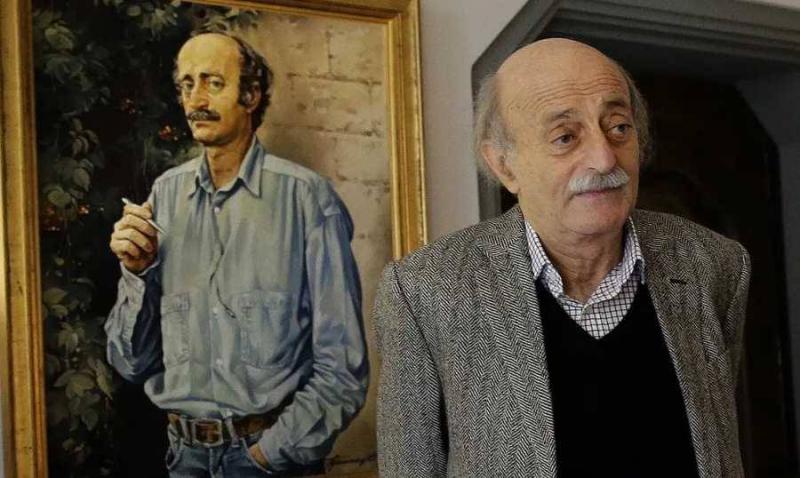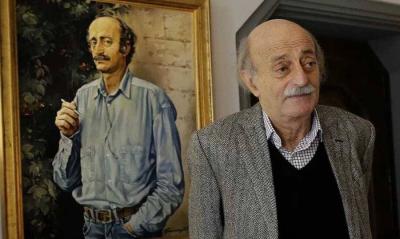With the conclusion of the parliamentary elections and the subsequent need for "work tools" dissipating, head of the Progressive Socialist Party Walid Jumblatt has returned to his pragmatism, recently shown in two positions: reopening dialogue with "Hezbollah" after a hiatus, and advocating for the election of a president who is centrist and transcends political divisions. So, what does he have in store as the constitutional countdown to electing the president begins?
It is clear that Jumblatt has decided to differentiate his political choices at this stage, standing at a "safe distance" from the rhetoric of opposition members, even though some consider him part of their ranks. He has approached "Hezbollah," but with a commitment to his specific views on contentious issues.
Undoubtedly, the fragmentation of the new parliamentary council into many minorities or minority majorities has allowed Jumblatt to gain significant influence under its dome in determining the trajectory of upcoming challenges, as was evident during the election of Speaker Nabih Berri for a new term.
Now, Jumblatt is preparing to play a substantial role in the presidential election, knowing that his bloc (the Democratic Gathering) forms one of the essential pathways for any candidate wishing to facilitate their ascent to Baabda Palace.
On the government front, Jumblatt appears flexible regarding the matter of the second Druze name meant to replace Minister Issam Sharafeddine in ongoing discussions about governmental formations and amendments. At the same time, he does not see why a caretaker government cannot fill the potential void in Baabda should attempts to form a complete and effective government fail.
Jumblatt confirms to "Al-Joumhouria" that he does not impose conditions on Druze representation in any new or amended government, specifically regarding the name that could replace Minister Sharafeddine. He believes that Prime Minister Najib Mikati is correct in the governmental formula he submitted to President Michel Aoun, "thus it can be adopted with some modifications if necessary," noting that there are "disasters" in the current government that should not be tolerated to avoid further deterioration.
He warns that energy is one of the primary issues that can no longer be left unaddressed, reiterating the need to establish a regulatory body for the sector with real, not feeble, powers, as is currently the case with the powers of the petroleum sector management authority.
When asked if the caretaker government can assume the President's powers in the event of a presidential vacuum, Jumblatt responds: Enough with the fear of a vacuum; the priority is to form a new government, and if that does not happen, then a caretaker government can indeed fill the void and assume the President's powers. Certainly, this scenario remains better than having a vacuum.
Jumblatt notes that the fundamental issue is to elect the president within the constitutional timeframe, considering that efforts should focus on achieving this priority "instead of being distracted right now by constitutional opinions that emerge as needed, tailored to narrow interests and factional calculations."
He calls on everyone not to rely on external factors regarding the presidential election, asserting that there is a need to "Lebanese-ize this milestone," as the escalating crises on all fronts cannot afford to be tied to regional and international complexities.
When asked if the challenging candidate championed by Lebanese Forces leader Samir Geagea has any chance of reaching Baabda Palace, Jumblatt replies: The challenging candidate, whoever proposes him, does not have a chance of reaching the presidency because the problem lies "within him," as his name suggests. How can one who seeks to challenge succeed in moving to Baabda in light of the current parliamentary structure and the prevailing political balances?
The Socialist Party leader adds: Political realism and national interest both necessitate the election of an agreed-upon president, transcending sharp divisions, who can open up to everyone and communicate with them, not the other way around.
When clarifying the status of the relationship with "Hezbollah" after the recent meeting in Clemenceau, Jumblatt explains that communication is ongoing but with no new developments, rejecting the framing of renewed dialogue with the party as a matter of organizing a dispute: "It's not about managing a conflict, but rather a necessary dialogue with others, including 'Hezbollah'; that's all there is to it."




